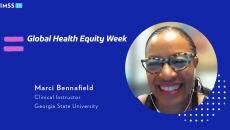health equity
At HIMSS24, experts discussed the value of cross-sector collaboration in delivering innovative care options to underserved communities.
Jeremy Petch, Hamilton Health Sciences' director of digital health innovation, discusses black box models and the importance of evaluating AI technology so as not to increase health inequity.
Clinical instructor at Georgia State University's health informatics program Marci Bennafield tells how mobile devices help researchers gauge health inequities and how customizing innovation can help address barriers to access to care.
THE IQ-Creator Program supports healthcare professionals in creating content for underserved communities, while Aloud uses AI to dub videos in multiple languages.
HIMSS23
ZeOmega's Associate VP of interoperability strategy, Michael Gould, and VP of advanced analytics, Pravin Pant, discuss how data can help payers and providers understand patients' social determinants of health and reduce disparities in care access.
Andrew Eye, cofounder and CEO of ClosedLoop.ai, discusses how AI can improve or increase health disparities, the value of explainable AI and the importance of open algorithms to ensure accuracy and fairness in data integrations.
HIMSS23
HIMSS and a number of countries have created a to-do list for improving access and health equity, says Tom Leary, SVP and head of government relations at HIMSS.
HIMSS23
Dr. Daniel Turner-Lloveras, cofounder and president of SaludConTech, discusses digital health's role in addressing healthcare disparities and improving access to healthcare services for communities of color.
HIMSS23
Dan Soule, VP of Technology Operations at Health Catalyst, discusses the great strides made in health equity over the last 10 years as well as how AI is finally moving forward with real-world uses.
Telemedicine and digital health expert Dr. Laura Purdy shares how interoperability in virtual care and digital health technologies can improve care delivery for patients and providers, and decrease disparities in health equity.








